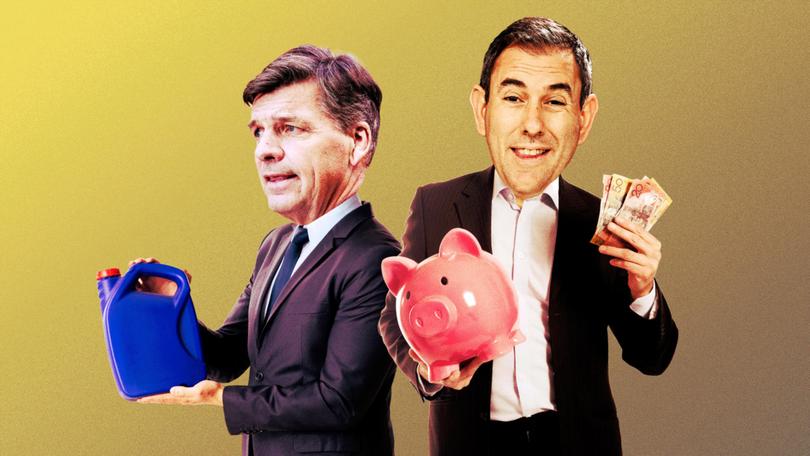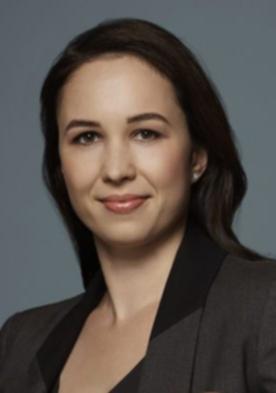Federal election 2025: Economic experts warn Labor and Libs’ ham-fisted handouts show lack of serious reform
The Coalition’s attempt to stymie Labor’s $5 a week tax cut with a $14-a-tank cut in the fuel excise has been described as ‘bonkers’ by one of Australia’s most experienced economists.

The Coalition’s attempt to stymie Labor’s $5 a week tax cut with a $14-a-tank cut in the fuel excise has been described as “bonkers” by one of Australia’s most experienced economists.
AMP’s Shane Oliver said there was no economic justification for the program, which would have made sense during the spike in energy prices during Russia’s invasion of Ukraine, but is now being proposed at a time when the oil price is 40 per cent lower than that peak.
“It’s just a sugar hit that doesn’t deal with any of the fundamental problems we have with our tax system,” Mr Oliver said.
Sign up to The Nightly's newsletters.
Get the first look at the digital newspaper, curated daily stories and breaking headlines delivered to your inbox.
By continuing you agree to our Terms and Privacy Policy.“I think it’s really just aimed at winning votes, there’s no economic justification for it. We should be looking at more fundamental things like indexing our tax scales, rather than just this silly little fiddle.”
The policy which the Coalition has described as “temporary and targeted” would reduce the cost of petrol by 25 cents a litre at a cost of $6 billion to the budget.
Shadow treasurer Angus Taylor said it would save the average driver $14 per tank and potentially $1500 a year if they refuel twice a week. The policy is aimed at hard-hit swing voters in outer urban swing seats.
“The people who are under the most stress across our economy are those with a mortgage in our suburbs and regions, really struggling to make ends meet,” he said.
“One of the challenges they’re facing is paying the bills for transport.
“This is a huge source of pressure, and these are the very families we see who are increasingly under enormous stress. We see them at food banks struggling to put food on the table.
By comparison Labor offered up $17b of tax cuts in Tuesday’s budget, that would kick in next year and, added to the already legislated stage three tax cuts would put $2790 in the pocket of a worker on an average full time income.
The fresh tax cuts have been opposed by the Coalition, allowing Treasurer Jim Chalmers to go on the attack ahead of Peter Dutton’s Budget reply.
“The tax cuts are not safe under Peter Dutton,” the Treasurer said. “That is something that Angus Taylor has admitted today. This will haunt them every day of the campaign. This is the most important difference between Labor and the Coalition in the context of Peter Dutton’s reply. No matter what he says tonight, he’s taken to the election higher taxes on Australian workers, and we won’t let them forget it.”
While the parties will be attempting to woo voters with handouts, economists are appalled.
Veteran budget watcher Chris Richardson decried the absence of any of any economic reform, and said there hadn’t been any bold leadership since the Keating-Howard era.
“The underlying quality of what is being served up by either side of politics is basically an embarrassment. It does not come to grips with a range of challenges and is a reminder, once again, that this is a Seinfeld election, an election about nothing,” he said.
“There are a number of important issues. Neither side is deeply grappling with them and that is a sad, sad thing.”
On balance, all the economists who spoke to The Nightly said the Government’s income tax cut was a preferable policy.
Diana Mousina, deputy chief economist at AMP, said the tax cuts would at least claw back some of the bracket creep that was pushing lower income workers into higher tax bands.

“Income tax cuts are much more beneficial because they’re done for the long term. Because our tax brackets are not indexed, it makes sense to to to give consumers or households income tax cuts, whereas a fuel excise cut is just temporary,” Ms Mousina said.
Neither policy is expected to be particularly inflationary however, Ms Mousina said, with the income tax impact still a year away and the fuel excise cut welcome relief, but not akin to receiving a cash handout.
“It is a clever way of reducing measured inflation. People don’t feel the impacts of a fuel excise cut, or a reduction to the energy bill as additional money that they can spend,” she said.
“If you give people a cheque, they would actually spend the money, but a reduction to their bill that they’re already paying for. I don’t actually think hits consumers in the same way. I don’t see it being inflationary.”
Gareth Aird, chief economist for the Commonwealth Bank, said that as a policy, the fuel excise cut would be more stimulatory for the economy, with consumers more likely to notice cheaper petrol than $5 more in their weekly pay.
“I think the sentiment channel is stronger from the petrol side,” Mr Aird said.
Commonwealth Bank calculations also suggested a “material” decline in headline inflation by about 0.5 per cent for the duration.
“Lowering the petrol exercise will lower headline inflation, and that means if you’re lowering headline inflation, you’re actually going to be lowering growth in government expenditure that’s linked to the headline CPI, like the age pension. So there’s actually savings in terms of government outcomes,” Mr Aird said.
Mr Richardson said the focus of both sides needed to turn to long-term fiscal repair rather than short-term measures.to appeal to voters.
“We’ve had a worsening in the underlying the structural position of the budget by almost $50b a year during the term of the current parliament. I understand that in many ways, there’s been a big drop in our living standards, and the punters aren’t happy,” he said.
“Wage earners are hurting, borrowers are hurting, taxpayers are hurting, and governments have reacted to that, but we’ve taken a temporary burst of tax revenue and we’ve made permanent promises to ourselves off the back of that. It isn’t the first time we’ve done it.
“You’d have thought we’d have learned by now.”
Mr Richardson welcomed news that the Instant Asset Write-Off, which allows small businesses to instantly deduct expenses up to $20,000, was pushed through Parliament by the crossbenchers overnight. Firms now have until June 30 to acquire assets new assets.
“We over-tax investment — the money spent on the future,” he said
“There are a variety of ways to encourage businesses to invest and this is a good policy.”
Labor has not committed to extending the policy beyond this year, angering business groups, who said it should be a permanent feature of the tax system, with the threshold increased to $50,000.
“All small business is asking for is certainty and to be treated with respect and at the moment we are not seeing that,” ACCI chief Andrew McKellar said.

